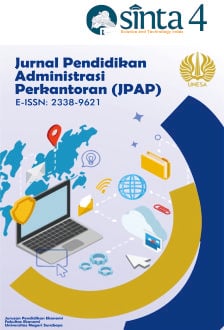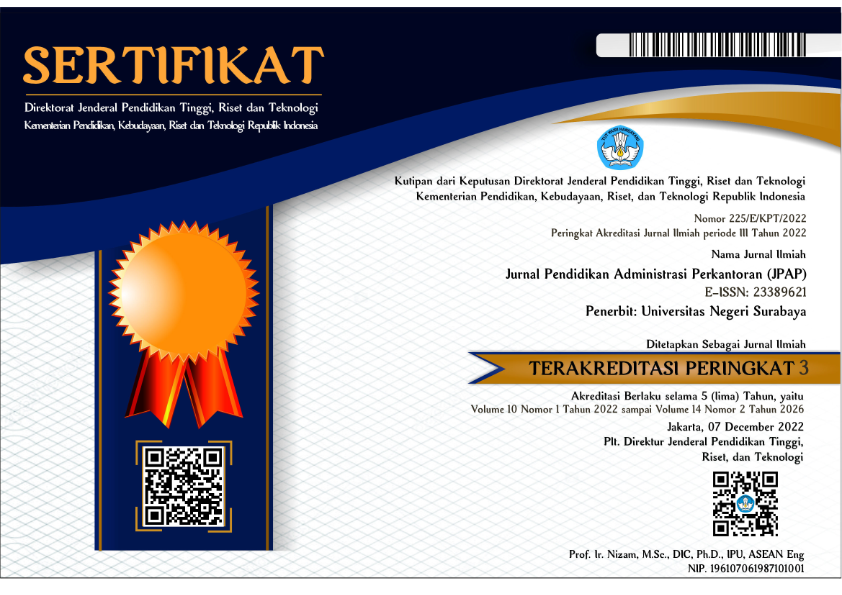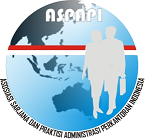Pengaruh Model Pembelajaran Problem Based Learning (PBL) terhadap Kemampuan Berpikir Kritis dan Pemecahan Masalah pada Mata Pelajaran Administrasi Umum Kelas X OTKP di SMK Negeri 10 Surabaya
DOI:
https://doi.org/10.26740/jpap.v9n2.p246-259Keywords:
Critical Thinking, Problem Solving Skills, Problem based learningAbstract
This study aims to see the influence of problem-based learning model (PBL) for critical thinking and problem solving skills in the general implementation of X-OTKP class in SMK Negeri 10 Surabaya. The type of research used is quasi Experimental Design Research, with the design of non-equivalent Control Group Design Research. The research samples use class X OTKP 1 and X OTKP 2 with a Total of 36 students. Data collection techniques in the form of interviews, observations, tests, and documentation. Research instruments used test sheets (pretests and posttests) as indicators of critical thinking ability, and a skill sheet used as an indicator of problem-solving capabilities. Analysis of research data using independent sample test test and gain score.Based on the results of analysis of T tests for problems Pretest and Posttest obtained tcount 3.611 with significance level 0.001. With a confidence level of 95%, the value of ? = 0.05, with (df) 70 so that it is obtained with (1.997). The results of the troubleshooting analysis obtained tcount 3.562 with a significance of 0.000 with a 95% confidence rate, value of ? = 0.05, with (df) of 70 so obtained this by (1.997). The gain score is tcount 2.065> ttable 1.997 then can be deduced H0 rejected then H1 received. The Inconclusive Learning Model (PBL) affects critical thinking ability and problem solving skills in the general administration of X-OTKP class in SMK Negeri 10 Surabaya.
References
Abdullah, Fauziah, & Hakim. (2013). Pembelajaran Saintifik Elektronika Dasar Berorientasi Pembelajaran Berbasis Masalah. Jurnal Invotec, IX(2), 165-178.
Arikunto, S. (2013). Prosedur Penelitian. Jakarta: Rineka Cipta.
Aunurrahman. (2014). Belajar dan Pembelajaran. Bandung: Alfabeta.
Farisi, Hamid, & Melvina. (2017). Pengaruh Model Pembelajaran Problem Based Learning terhadap Kemampuan Berpikir Kritis dan Meningkatkan Hasil Belajar Siswa pada Konsep Suhu dan Kalor. Jurnal Ilmiah Mahasiswa (JIM) Pendidikan Fisika, 2(3), 283-287.
Hamdani. (2011). Strategi Belajar Mengajar. Bandung: CV. Pustaka Setia.
Hanafy, S. (2014). Konsep Belajar dan Pembelajaran. Lentera Pendidikan, 17(1), 66-79.
Hariyanto & Suyono. (2014). Belajar dan Pembelajaran. Bandung: PT Remaja Rosdakarya.
Kurniatunnisa, Nur, K. D., & Nur, R. U. (2016). Pengaruh Model Problem Based Learning terhadap Kemampuan Berpikir Kritis Siswa Materi Sistem Ekskresi. Journal of Biology Education, 5(3), 310-318.
Nopia, R. & Sudjana, A. (2016). Pengaruh Model Problem Based Learning terhadap Keterampilan Berpikir Kritis Siswa Sekolah Dasar pada Materi Daur Air. Jurnal Pena Ilmiah, 1(1), 641-650.
Nurdiyansyah & Fahyuni. (2016). Inovasi Model Pembelajaran. Sidoarjo: Nizamia Learning Center.
Pebriana, R. & Disman. (2017). Effect of Problem Based Learning to Critical Thingking Skills. Journal of Elementaru Education, 1(1), 109-118.
Putri, N. (2018). Pengaruh Model Pembelajaran Problem Based Learning terhadap Kemampuan Berpikir Kritis Siswa pada Mata Pelajaran Ekonomi Kelas XI IIS di SMAN 3 Surabaya. Jurnal Pendidikan Ekonomi (JUPE), 6(3), 236-241.
Rosy, B. & Pahlevi, T. (2015). Penerapan Problem Based Learning untuk Meningkatkan Kemampuan Berpikir Kritis dan Kemampuan Memecahkan Masalah. Prosiding Seminar Nasional, hlm.160-175, Universitas Negeri Surabaya, Surabaya.
Rusman. (2018). Model-model Pembelajaran. Depok: PT Rajagrafindo Persada.
Salwiah. (2016). Upaya Meningkatkan Hasil Belajar PKN dalam Materi Globalisasi melalui Model Pembelajaraan Kooperatif Tipe Jigsaw pada Siswa Kelas XI SMP Negeri 1 Banda Aceh. Jurnal Media Inovasi Edukasi, 2(1), 264-272.
Shoimin, A. (2017). 68 Model Pembelajaran Inovatif dalam Kurikulum 2013. Yogyakarta: Ar-ruzz Media.
Sihaloho, Sahyar, & Ginting. (2017). The Effect of Problem Based Learning (PBL) Model Toward Students Creative Thinking and Problem Solving Ability in Senior High School. IOSR Journal of Research & Method in Education, 7(4), 11-18.
Sugiyono. (2017). Metode Penelitian Pendidikan Pendekatan Kuantitatif, Kualitatif, dan R&D. Bandung: Alfabeta.
Undang-undang Republik Indonesia No 3 Tahun 2003. Sistem Pendidikan Nasional.
Utomo, T., Wahyudi, D., & Hariyadi, S. (2014). Pengaruh Model Pembelajaran Berbasis Masalah (Problem Based Learning) terhadap Pemahaman Konsep dan Kemampuan Berpikir Kreatif Siswa (Siswa Kelas VIII Semester Gasal SMPN 1 Sumber Malang Kabupaten Situbondo Tahun Ajaran 2012/2013). Jurnal Edukasi (UNEJ), I(1), 5-9.
Warda, A. & Sudibyo, E. (2018). Keterampilan Berpikir Kritis Siswa dalam Implementasi Model Discovery Learning pada Sub Materi Pemanasan Global. E- Journal Pensa, 06(02), 238-242.
Yuhani, A., Sylviana, L., & Hendriana. (2018). Pengaruh Pembelajaran Berbasis Masalah terhadap Kemampuan Pemecahan Masalah Matematis Siswa SMP. Jurnal Pembelajaran Matematika Inovatif, 1(3), 445-452.
Yusri, A. (2018). Pengaruh Model Pembelajaran Problem Based Learning terhadap Kemampuan Pemecahan Masalah Matematika Siswa Kelas VII di SMP Negeri Pangkajene. Jurnal Musharafa, 7(1), 51-62.
 Abstract views: 6466
,
Abstract views: 6466
, PDF Downloads: 15917
PDF Downloads: 15917










